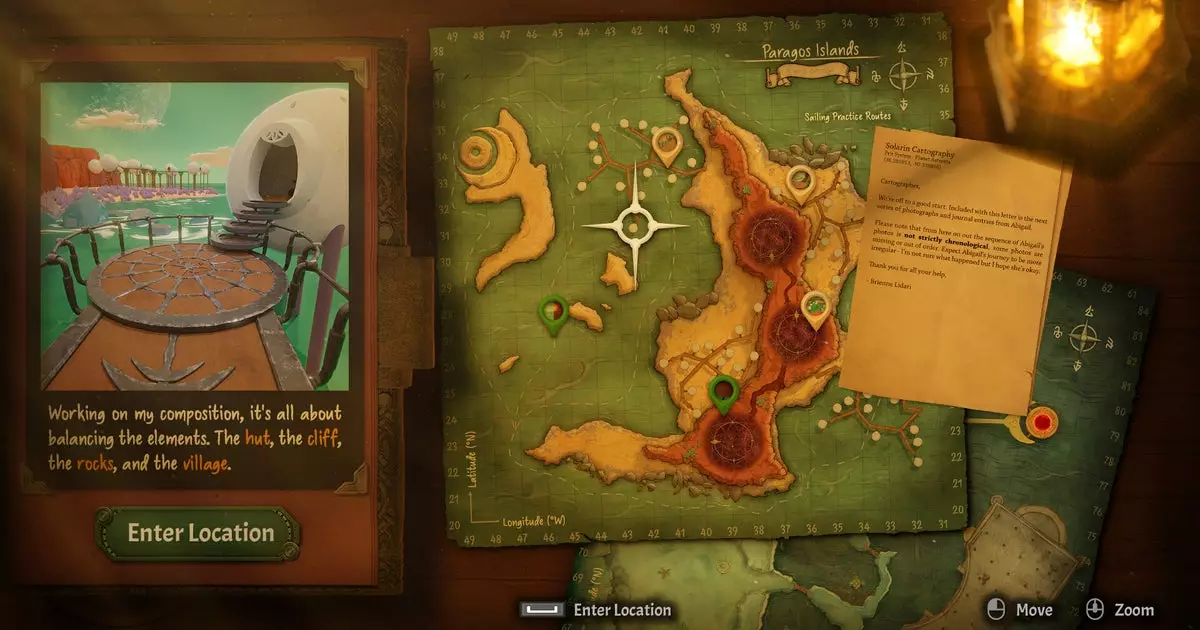In the realm of indie gaming, few concepts captivate as thoroughly as the marriage of detective work and cartography presented in “Locator.” This game promises to engage players on an extraordinary journey as an interstellar cartographer, embarking on a mission to locate the elusive archeologist Abigail Lidari on a mysterious alien world. Drawing influence from the popular geography game Geoguessr, Locator transports players into a vivid landscape where exploration and deduction are paramount. The combination of beautiful alien maps and the quest for knowledge invites a unique interaction that distinguishes Locator from conventional puzzle games.
At the heart of Locator’s gameplay lies the dynamic process of comparing photographs with Abigail’s personal journal. Players are tasked with placing pins on meticulously crafted maps to indicate where they believe Abigail might be. This initial straightforward challenge morphs into a complex web of puzzle-solving that requires careful analysis and cross-referencing of clues found within the journal. The game encourages players not only to identify landmarks but to imagine the environment through Abigail’s eyes, which adds a layer of empathetic understanding to the gameplay.
An early puzzle showcases this approach brilliantly, as players are prompted to locate imposing cyclopean statues within an expansive alien tomb. With whimsical sketches and amusing names bestowed upon the statues by Abigail—such as Milton and Orville—the game effectively conveys the isolation and creativity that can emerge in unfamiliar surroundings. Such design choices foster a connection with Abigail, inviting players to engage in her narrative rather than merely deciphering it.
More than just a series of puzzles, Locator invites a deeper contemplation of the relationship between perception and reality through its gameplay mechanics. The developers cleverly evoke the philosophical notion that “the map is not the territory,” a concept popularized by Alfred Korzybski. This adage serves as a constant reminder that our understanding of an environment is shaped by our interpretations, which adds an enriching layer to the exploration of alien landscapes. As players delve into Abigail’s world, they are challenged to reevaluate their assumptions and experience the nuances of her journey through their own puzzle-solving.
Furthermore, the game elegantly intertwines spatial reasoning with logical deduction, a combination that appeals to fans of both detective narratives and geography. As players navigate through various challenges—such as interpreting constellations and identifying unique wildlife—Locator seamlessly integrates gameplay mechanics that require both intuition and analytical prowess. This multifaceted approach enhances the overall experience, ensuring that the adventure remains both stimulating and immersive.
While no release date has been announced, the anticipation surrounding “Locator” is palpable. The combination of its visually stunning maps, engaging gameplay, and thought-provoking themes create a strong foundation for what could become a standout title in the indie gaming community. As players await the opportunity to embark on this galactic journey of discovery and reflection, one thing is clear: Locator is poised to offer a unique blend of challenge, empathy, and artistic exploration that is sure to resonate with many.

